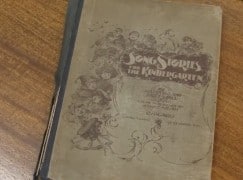University could lay claim to Happy birthday copyright
mainWarner Music has got rich in court on protecting what it claims to be its copyright in the song.
Now an original copy has turned up at the University of Louisville.
The song, unearthed by librarian James Procell, was part of a songbook called Song Stories for Kindergarten, written by Louisville residents Patty and Mildred Hill. That manuscript was later donated to the Louisville Dwight Anderson Memorial Music Library by a family friend in the 1950s, but remained buried and uncatalogued for decades.
Read more here.
Sadly, this is is not the version with the ribald words.






Please do reveal the version with the ribald words.
Ditto on Furzwängler’s query. The request is, of course, strictly for scholarly reasons.
In preparation for the Urtext edition, of course.
Whom shall we ask to provide the professional textual annotations?
Not to mention notes on authentic performance practice. E.g. the length of the Luftpause between the end of the song and the blowing out of the birthday-cake candles. And whether it is good period practice to extinguish them in one breath.
The headline seems incredibly misleading. Possession of an early copy, even the original handwritten copy, does not imply ownership of the copyright.
The newly-discovered copy does seem likely to establish dating information relevant to the case, but that dating information would support the argument that the song’s copyright has long expired, not that the University would own the copyright.
Quite agree. But accuracy in headlines is not always this blog’s strong point.
The story here is only half right. What was discovered in Louisville is a manuscript for “Good Morning to You,” which has the melody but not the words to “Happy Birthday.” A recent lawsuit by filmmaker Jennifer Nelson against publisher Warner/Chappell turned up a published version of the song from 1922. Any music published prior to 1923 is in the public domain.
This story shows it’s good to get a copyright, but it’s also good to get the copy right. Otherwise, we get blogged down with inaccuracies.
If published before 1923 it is public domain in the USA, but not necessarily anywhere else.